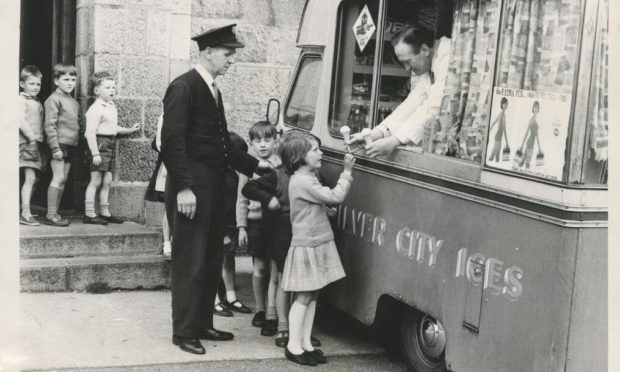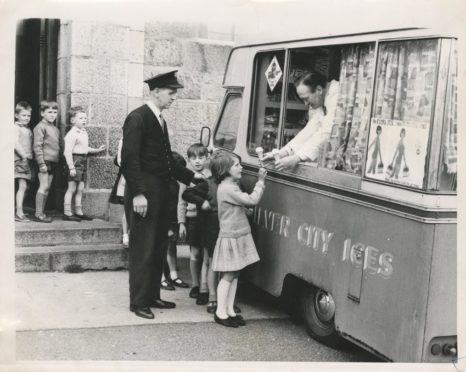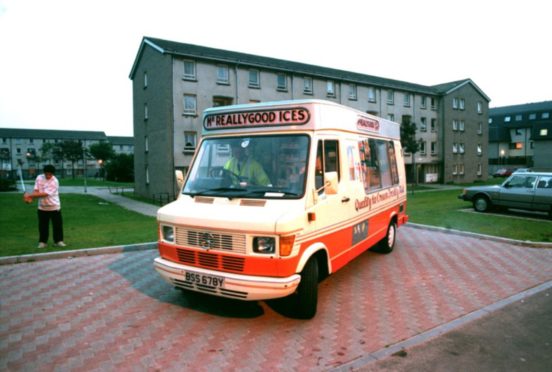The tinkling of ice cream van chimes is a familiar sound in Aberdeen’s neighbourhoods on sunny, summer days.
It’s a tinny tune that has delighted children for decades – but is every parent’s worst nightmare when a visit coincides with bedtime.
Many people will remember the childhood excitement of hearing the distant chimes and waiting for the icer to trundle up the street.
But the noise was considered such a nuisance on the streets of Aberdeen 60 years ago, that magistrates banned the magical music.
For whom the chimes toll
Concerns were first raised by Aberdeen councillors in 1961 when shift workers were understandably irate at being awoken from their slumber by jangling renditions of Greensleeves on repeat.
In an attempt to address the complaints, ice cream manufacturer T Wall and Sons was informed it could not allow vans to play music through loudspeakers where people who worked nightshift resided.
The obvious was quickly stated: how was it possible to know where every shift worker slept in Aberdeen?
The debate rumbled on into the following year, and to help in the decision-making, a chiming of tunes was held at a meeting of Aberdeen magistrates.
In a surreal situation, magistrates gathered in the courtyard at Lodge Walk in Aberdeen to hear the demonstration of chimes from Lyon’s and Co.
Liking what they heard, permission was granted to play the chimes – but only during certain hours of the day.
But the complaints continued to be heard loud and clear – and by October 1962 Aberdeen became the only city in Scotland to impose a complete ban on chimes.
A crime to chime
Members of the Aberdeenshire, Kincardine and Banffshire branch of the Ice Cream Alliance were furious.
In 1963, they called on Labour MP for Aberdeen North, Hector Hughes, to take their plea to Westminster in the hope of having the ban overturned.
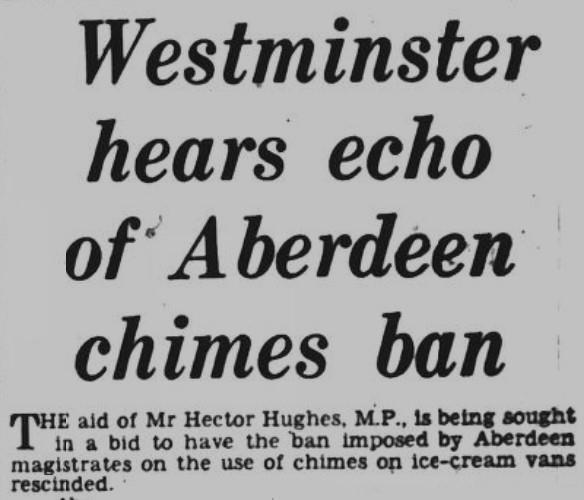
An appeal to magistrates by Wall’s had already been unsuccessful.
George Street restauranteur Vincent Sacco, secretary of the Ice Cream Alliance, highlighted that ice cream vans were allowed to play their chimes “in Dundee and English towns”.
Yet Aberdeen was the only city to impose a blanket ban on the melodies.
Magistrates stood firm with their decision – yet another appeal lodged by the alliance in 1964 was rejected.
Explaining the noises the panel took exception to, Andrew Forman, one of the city baillies, said: “They are the ones we are subjected to unnecessarily, especially in the housing schemes during the evening.
“For parents trying to get a young family off to sleep it can be a great annoyance.
“If traders were regular in their habits, people would know when to expect them.
“After a day’s work it is nice to have things quiet in the evening.”
But this wasn’t a view shared by George Morrison, an ice cream vendor on Union Street.
He said: “Since chimes have been banned I have lost a lot of customers.
“They all think it is very stupid to ban them.
“It is only the people who do not buy ice cream who consider chimes to be noisy.”
Another trader considered the charming chimes to be part of the customer service and added: “Aberdeen is the only city in Scotland to ban them.”
A city librarian even got involved in the debate, siding with the magistrates, and said: “I do not like noise.
“I am accustomed to quiet places, and therefore that is the kind of life I like.
“For instance, I do not like The Beatles.
“As far as I’m concerned, silence is golden.”
Sign of the chimes
But the cold war continued into the next decade.
The all-out ban had been lifted, but ice cream vendors were subject to strict rules under the 1974 Control of Pollution Act, which permitted chimes between the hours of noon and 7pm only.
Anyone who fell foul of the city’s environmental inspectors could expect a fine.
In 1976, two traders found themselves in court after being caught playing their chimes in Dyce at 11.10pm and 10.50pm.
And the following year, legendary Aberdeen ice cream vendor Loreto Pacitti landed a £15 fine when an environmental health inspector, hot on his heels one night, heard his van chime after 8pm.
The complaints still rolled in, with a group of residents in Bridge of Don particularly irritated by late-night ice cream van visits.
Several reported being awoken during the night by the not-very-dulcet-tones of the local icer.
A letter was issued to any rogue traders caught chiming after dark, but the rules ramped up yet again in 1981.
Ringing the changes
Chime complaints weren’t unique to Aberdeen; increasing concerns led the government to introduce UK-wide codes of practice.
In an attempt to combat the noise pollution, ice cream vans were now only allowed to sound their chimes 20 times an hour for four seconds at a time.
And they could only be sounded once at each stopping place.
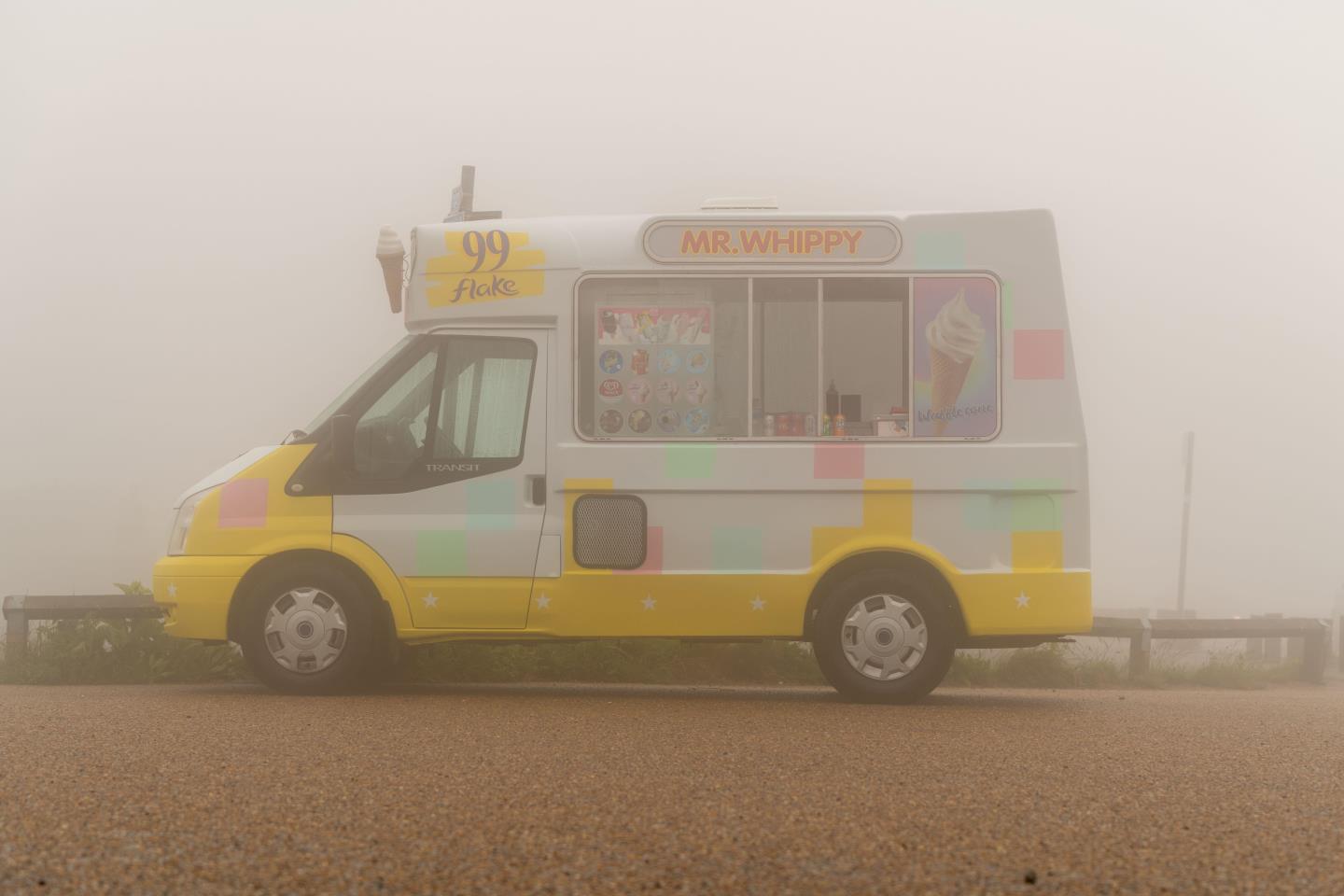
To this day, ice cream vendors still have to abide by the strict code of practice on ice cream van chimes.
However, the regulations were relaxed marginally following a consultation in 2013.
Traders can now play chimes 30 times an hour for 12 seconds at a time.
But perhaps to the relief of parents and shift workers everywhere, the 47-year-old rule banning chimes beyond 7pm remains.
How noisy are ice cream van chimes?
Breathing: 10 decibels
Rustling leaves: 20 decibels
Soft whisper: 30 decibels
Refrigerator hum: 40 decibels
Light traffic: 50 decibels
Conversation in restaurant: 60 decibels
Washing machine: 70 decibels
Ice cream van: 80 decibels
Lawn mower: 90 decibels
Riding a motorcycle: 100 decibels
Live rock music: 120 decibels
Air raid siren: 130 decibels
Fireworks: 140 decibels
Fighter jet take-off: 150 decibels
More like this:
